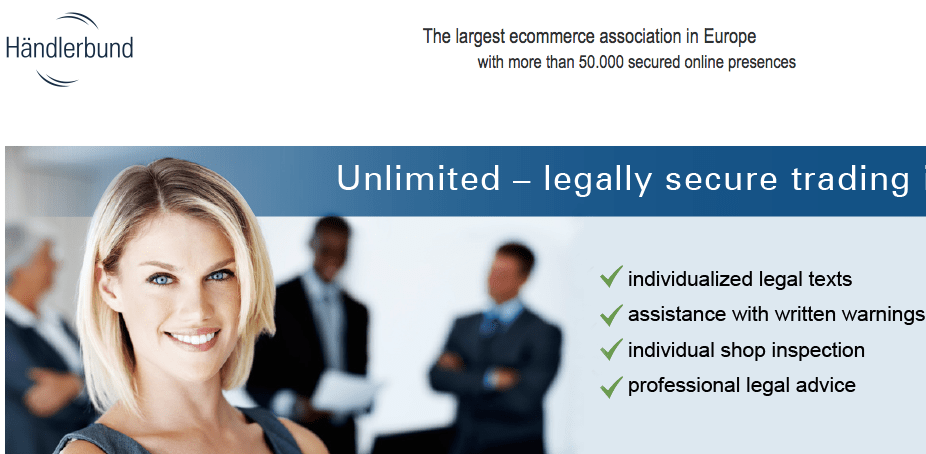“The legal instrument of the written warning is widespread in Germany and it is used against merchants when there is a violation of consumer law, competition law, trademark law or copyright law”, says Annegret Mayer from Händlerbund. In the run-up to her talk at the E-commerce Berlin Expo in February, in this interview you will learn about the key legal challenges of the German e-commerce and the steps you should take to sell legally and safely in Germany.
Paulina, E-commerce Berlin Expo: You are the Head of Legal Department at Händlerbund, the largest ecommerce association in Europe. Händlerbund oversees over 50,000 online presences, including small and medium-sized businesses. Händlerbund also cooperates with the umbrella organisation Ecommerce Europe, which enables it to represent the interests of the ecommerce industry across Europe and to provide European legislative procedures. How large is your team? How do you work?
Annegret Mayer, Händlerbund: 14 experienced lawyers work in the legal department at Händlerbund. It’s quite a team giving legal advice via telephone or email towards our members in the field of ecommerce. Each lawyer has a special field of expertise, such as data protection, youth protection, contract law or product labeling. We also provide our members with all relevant legal texts for trading online. The legal department is also responsible for auditing the online shops of our members regarding legal aspects. Defined review criteria cover all the legal requirements that are important for online trading. If the audit of the online shop is successful, our members receive the Käufersiegel Trustmark, as well as the Ecommerce Europe Trustmark, enabling merchants to communicate that they are trustworthy and that they comply with the European consumer law.
Händlerbund supports companies not only from Germany, but also from as diverse markets as Austria, Spain, France, Switzerland, UK, Denmark, Belgium, Greece and the Netherlands.
How did you manage to gather so many (and diverse) e-commerce bodies in one association?
We partly employ own staff in our legal department, but we also cooperate with the legal departments of National Associations that are organized within Ecommerce Europe.
Apart from legal representation and advice, what other support do you offer to the members of your association?
There are many other services we provide for our members. First of all, Händlerbund wants to be the first contact for all the e-commerce aspects for our members and we want to support them to professionalize their online business. Having that in mind, we support our members for instance with customer service for their online business or with the support in SEO or SEA, or law enforcement transcription. Händlerbund also organizes workshops on different topics and many networking events. We believe that the exchange between our members is crucial and valuable in the online business.

Companies from other parts of Europe commonly perceive the legal aspects of operating on the German e-commerce market as a challenge. Is this perception a truth or an exaggeration? What, in your opinion, are the roots of this perception?
To some extent it is indeed a challenge to enter the German market. The legal instrument of the written warning is widespread in Germany and it is used against merchants when there is a violation of, for example, consumer law, competition law, trademark law or copyright law. There are many reasons for a written warning; surveys prove that every fourth merchant already received a written warning. Having these figures in mind, it is important to be aware of the legal challenges of the German market and to have legal assistance when entering the German market.
What are the biggest or most frequent legal problems that companies willing to enter the German e-commerce market?
Companies are entering a market where German law applies. Even though in some areas we have legal regulations harmonized within the European Union (for example, the information on the right of withdrawal or pre-contractual information), there are still differences in national law that companies have to be aware of.
And what are the most frequent mistakes that such companies make?
Companies fail to inform consumers appropriately for instance concerning their right of withdrawal. Other most common mistakes include incorrect information on the imprint, the use of unfair terms and conditions, missing information about product labeling, pricing, shipping costs and Online Dispute systems. These are mainly basic information and consumers need to decide whether to buy in the online shop or not. Further mistakes by companies are, for example, the violation of copyrights and trademarks.
Making legal mistakes also means consequences – how severe can these be?
The worst case would end in a tremendous financial damage. The range of financial sanctions varies from 1.500,00 € for a violation of competition law to several thousand Euros depending on the case. It’s usually severe when trademark law is infringed. That is why it’s so important to be aware of the legal environment and to have legal expertise in the special field of the e-commerce law. It prevents merchants from making this kind of legal mistakes, so it is worth to invest the money into legal advice and support.

What would you recommend to a company willing to enter the German e-commerce market? What steps should be taken first to ensure compliance with German legal regulations?
I strongly recommend to get legal advice, ideally even before entering the German e-commerce market. The most important thing is to get all legal texts that are relevant and necessary for the online shop or platforms. The legal texts are the first eye-catcher for competitors or associations who file written warnings and about 80-90 % of the mistakes companies usually make are a part of the legal texts. A second important pillar is to get an audit of the online shop as a whole, meaning a check of, for example, product descriptions, product presentations, advertising messages and product labeling.
Big e-commerce companies entering the German e-commerce market usually have their legal departments that ensure compliance with law – or they have budget for the relevant legal advice services. What is the situation in the case of SMBs? Do they often seek professional legal advice? Or maybe they do it too rarely – and fail because of trying to solve everything on their own?
SMBs, respective for the members of Händlerbund, often seek professional legal advice in all kinds of fields concerning the conclusion and the proper fulfillment of a contract. In the majority of cases, SMBs cannot afford their own lawyers or a legal department. That is where we jump in and give all possible advice on our members’ request.
As an expert in this domain, what websites and other resources would you recommend as a knowledge base for companies thinking about entering the German e-commerce market? Where should they look for information?
Companies can have a look at the Händlerbund’s website. We provide many, many fact sheets and valuable information for free that merchants can use for a first overview of the German market. Furthermore, the websites of Chambers of Industry and Commerce provide material on the German markets and offer a good first source.
You are the speaker at the E-commerce Berlin Expo in February 2017 – the topic of your talk is “The German E-Commerce Market – Legal Aspects”. This event itself is an exceptional meeting place for, both, the big and the small e-commerce companies with different backgrounds and experiences from different markets. How do you feel before talking to such a diverse audience?
I feel challenged and excited. I’m looking forward to meeting companies with different backgrounds and I also see it as an opportunity to learn more about other markets.

Annegret Mayer, born in Frankfurt (Oder) in 1978, has worked at Händlerbund since 2009. Since 2010, she has been head of the legal department at Händlerbund. In this function, she is responsible for the organization and workflow of the legal department and the ex pansion of the legal services for the Händlerbund members. Annegret Mayer is also active in association work for Händlerbund on a national and international level as Händlerbund is a member of the European umbrella organization Ecommerce Europe.

